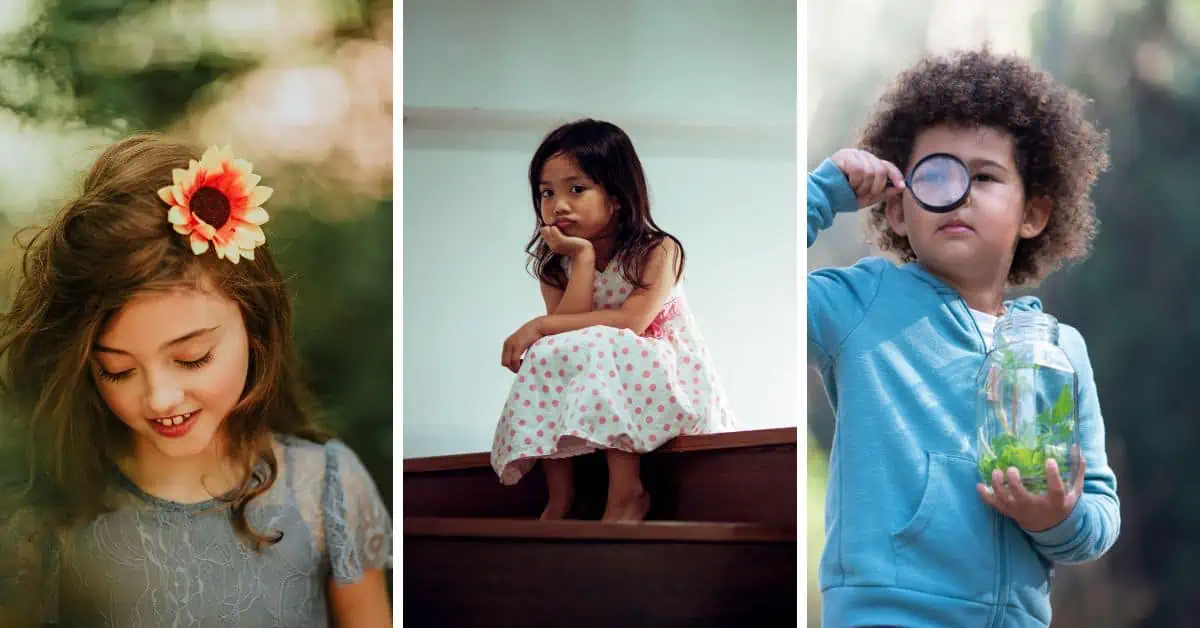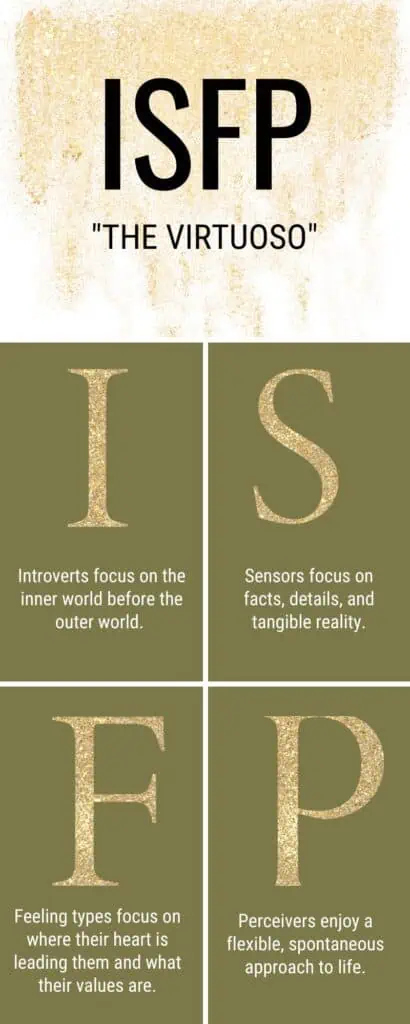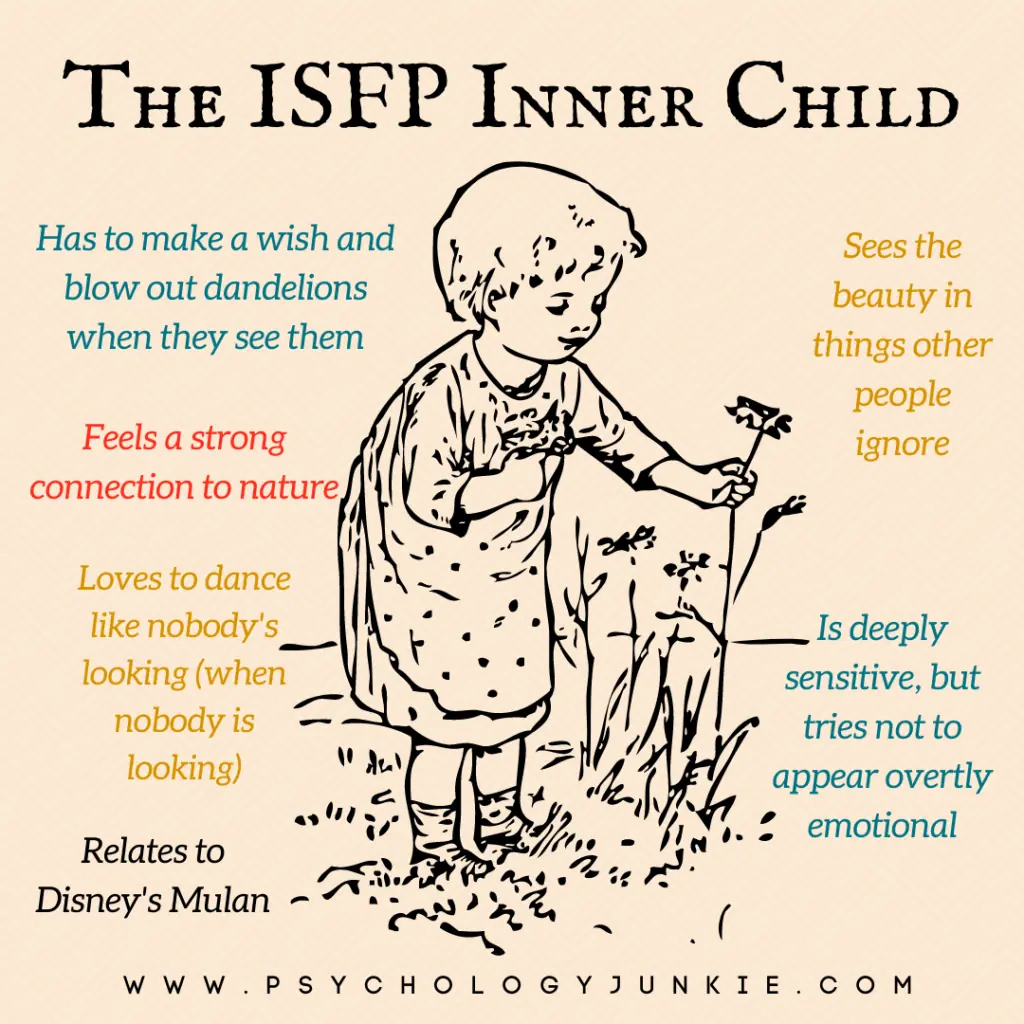The Childhood Struggles of ISFPs
Do you ever look back on your childhood and wonder why it felt so rocky and difficult? Perhaps your childhood was riddled with highs and lows; moments where you felt blissfully happy and free and others where you felt completely misunderstood. Today we’re going to get deeper into all of that as we explore your ISFP personality type and how that may have impacted you as a child. Let’s get started!
Not sure what your personality type is? Take our easy, in-depth personality questionnaire here. Or you can take the official MBTI® here.

First of all, what is an ISFP personality type?
ISFPs, often referred to as the “Adventurers” or “Virtuosos”, are individuals who exude a certain kind of quiet mystery intertwined with a deep, artistic sensitivity. They are introverted, sensing, feeling, and perceiving, the initials of which form their personality type – ISFP.
- Introverted (I) – ISFPs lean towards introversion, meaning they often prefer solitude or small group settings. They recharge their batteries through introspection and personal time, rather than through social interaction or focus on external activity.
- Sensing (S) – Sensing individuals tend to focus more on the present and concrete information. They’re grounded in reality and are primarily concerned with what they can perceive through their five senses.
- Feeling (F) – The ‘Feeling’ aspect of the ISFP’s personality signifies they make decisions based on personal values and how their actions might affect others. They are guided by a gut sense of what matters to them more than a sense of what’s inherently logical.
- Perceiving (P) – The perceiving preference in ISFPs reflects a flexible and spontaneous nature. Rather than desiring rigid structure and plans, they prefer to keep their options open and go with the flow, embracing the unexpected.
The ISFP Child
An ISFP child often harbors a vibrant and profound interior universe brimming with values, dreams, and incessant questions. They have a burning drive to understand their identity, their place in the world, and to fathom the duality of life’s beauty and darkness.
As dominant Introverted Feeling types, they navigate the world primarily through the lens of their personal values and the emotional implications of their surroundings. This essentially means their inner moral compass, as opposed to external facts or societal norms, guides them. They are driven to discern what truly fulfills them, instills a sense of purpose, and gives them meaning.
This journey is not just about following what others say is right or wrong. Instead, it involves diving deeper, into the very core of their being, to understand how they personally feel about these moral constructs. This introspective journey shapes not only their self-concept but also their interactions with the world around them, making them who they fundamentally are as ISFPs.
ISFP children are often drawn to the wonders of the natural world, a manifestation of their auxiliary function, Extraverted Sensing (Se). This function urges the young ISFP to be part of the physical world in all its grandeur and to interact with it in a rich, tangible way. It explains why many young ISFPs relish the feeling of the cool, damp earth beneath their bare feet, the thrill of constructing make-believe fortresses in the wilderness, or the adventure of attempting to tame untamed creatures. They seek to touch, to taste, to smell, and to immerse themselves in the sensory delights the world offers. These experiences satiate their curiosity and fuel their sensory-rich imagination. The Extraverted Sensing function, therefore, plays a key role in the ISFP’s interaction with the world and contributes significantly to their childhood experiences, their development, and their overall personality.
The Struggles of Being an ISFP Child
The ISFP’s unique approach to life is not without its struggles. Their tendency to question societal norms and values, to seek and uphold their unique moral compass, can create an uncomfortable friction with the world around them. They are frequently met with misunderstanding, or even outright disapproval, when they choose not to conform, when they elect not to be like everyone else or follow the beaten path.
For instance, an ISFP’s hesitance to accept rules at face value can be misinterpreted as defiance or disrespect, particularly in traditional educational or familial structures that value obedience over questioning. Their desire to discover their own values, to meander along the path that resonates with their unique rhythm, can make them come across as non-conformists or even rebels. This is not due to a desire to be difficult, but simply a reflection of their inherent drive to be authentic and true to themselves.
The ISFP’s preference for marching to the beat of their own drum, of choosing spontaneity over rigid schedules, can further contribute to their perceived eccentricity. Their preference for flexibility, for space to respond to life in the moment, can be a source of conflict in environments that prize predictability and order. This often leads to the unfortunate myth that ISFPs are disruptive or uncooperative, further enhancing their sense of being misunderstood and isolated.
ISFPs in the Classroom:
ISFPs learn best through hands-on exploration, creativity, and trial-and-error. They tend to do well in Montessori or “forest” schools, where creativity and connection with the natural world is encouraged. Yet these schools aren’t mainstream and most ISFPs don’t get to experience that type of learning.
Take, for instance, the case of Emily, a young ISFP student. Emily was often criticized by her teachers for her tendency to get lost in her own world during lectures. While the class was busy memorizing facts and figures, Emily would be found doodling intricate patterns in her notebook or gazing longingly towards the birds outside the classroom window. At first glance, this might have been interpreted as a lack of focus or interest in the class. However, this was far from the case.
Emily, as an ISFP, was hungry for knowledge. Yet, she learned in a different way than what traditional educational systems typically account for. Sitting in a room, repeating the same facts over and over, felt monotonic and disengaging to her Sensing-Perceiving nature. Emily learned best by doing, by interacting with the world around her, by directly experiencing the subject matter at hand. This was not a sign of defiance or lack of intelligence, rather it was a demonstration of her unique approach to learning, one that was hands-on, exploratory, and rooted in the real world.
The Need for Connection
Feeling valued and understood was also crucial to Emily’s learning process. She needed an environment that respected and nurtured her unique ways of learning. An environment where she wasn’t penalized for her curiosity and need for hands-on movement and creativity, but instead was encouraged to explore her interests and creatively experiment with art supplies to learn her figures. Perhaps she could have painted her facts and figures rather than simply repeat them over and over again. Instead, Emily, like many young ISFPs, developed a feeling of inadequacy. She felt like her way was “wrong”, not different.
The Sensing-Judging style of education emphasizes structure, order, and rote memorization of facts and figures, a stark contrast to the ISFP’s need for hands-on, experience-based learning. This divergence is not a measure of the ISFP’s intellectual capacity but rather a mismatch in learning styles. The ISFP’s classroom struggles are not necessarily a reflection of their knowledge or understanding, but rather an indication of an education system that diminishes and underserves their natural learning needs. Still, many ISFPs learn to work within the system and perform well; but often they look back on their school years as a struggle, not something that felt as fulfilling as it would to other types.
The Fight to Express the True Self
In many societal and educational structures, children are encouraged to display traits of Extraverted Feeling (Fe) over those of Introverted Feeling (Fi). Lessons of politeness, group values, and playing well with others” are imparted early, subtly favoring those who naturally lean towards Fe. These lessons are, of course, valuable, but they can inadvertently stifle the unique strengths of children with a dominant Fi, like ISFPs.
ISFPs are frequently the children in the corner, observing the world around them with an earnest curiosity and a deep sense of wonder. They notice what matters to people. What the teacher really wants. What the parent really wants. They notice when what people say doesn’t align with what they actually want. For example, a parent might argue that they want their child to be obedient and kind and say “How are you?” and give Aunt Liz a hug. But the ISFP might know that what the parent really wants is to make a good impression on Aunt Liz; for Aunt Liz to be impressed, more than for the child to be kind.
ISFPs question the rights and wrongs and prefer to march to the beat of their own drum. They are seldom encouraged to challenge authority, to voice their disagreements, or to celebrate their unique identities. This suppression of their authentic selves can be debilitating, as it forces them to fit into molds that do not resonate with their inner truths.
Even the physical mannerisms of ISFPs can be misunderstood. They may appear withdrawn, reserved, and hard-to-read, a stark contrast to the open expressiveness associated with Fe types (FJ personality types). ISFPs feel deeply and have a high sensitivity to their surroundings, but they don’t readily wear their emotions on their sleeves. Their empathy for others is profound, but they might not greet people with large smiles or big bear hugs. As put succinctly by Isabel Briggs-Myers, “They wear their warm side inside, like a fur-lined coat.” This can lead to ISFPs being misinterpreted as aloof or indifferent, when in reality, they are just expressing their feelings in a more internalized, personal manner.
The Sensitive Nature of ISFPs
ISFP children are often characterized by a deep sensitivity, a trait that allows them to feel and perceive the world around them with remarkable intensity. Their sensitivity, however, is frequently misunderstood by those around them. Parents may label their ISFP child as “over-sensitive”, failing to understand that their rich emotional responses are simply an inherent aspect of their personality type.
Let’s use the example of an ISFP child named Arthur. Arthur watches as his sibling is chastised by their parents for a minor infraction. He feels a wave of indignation rise within him, a deep conviction that the punishment is unfair. Despite the risk of incurring the same wrath, he stands his ground, passionately defending his sibling and insisting that the punishment is unjust. He berates his parents, calls them out on their unfairness, and refuses to back down.
This example is just one of many that I’ve heard from ISFPs where they resisted authority and stood up against perceived injustice at an early age. They are guided by a strong moral compass, a clear sense of what they believe is right or wrong. Even if they are afraid, they will often challenge authority if it conflicts with their values, even if such confrontation is uncomfortable or met with resistance.
Along with their firm grasp of justice, ISFPs are also deeply emotional beings. However, they tend to guard their feelings closely, only revealing them when they feel safe and accepted. They may cry easily, which is frustrating for them because they tend to be very protective of their inner emotions. Being seen crying in public can overwhelm them with a sense of vulnerability and frustration. It’s essential for parents and caregivers to understand these characteristics, providing a supportive environment where ISFPs feel comfortable expressing their feelings and standing up for their beliefs.
The Disconnect from Nature: An ISFP Struggle
In an increasingly digitized world, children are spending more time hunched over screens and less time absorbed in the natural exploration of the world around them. School systems have become more structured, rigid, and regulated, leaving less room for spontaneity, interpersonal connection, and the joy of recess. In the rush of life, parents too are quick to shuttle their children from one indoor activity to another, overlooking the value of simple, unstructured playtime outdoors. This disconnection from nature and the tactile, sensory world is especially difficult for personality types such as the ISFP.
Being introverted, ISFPs value their alone time to recharge and introspect. However, as Sensing-Perceivers, they also possess a deep, innate need to interact with their environment in a tangible, meaningful way. They crave the chance to run freely, experiment with natural elements, touch the texture of life, and immerse themselves in the sensory richness the world has to offer. The ubiquitous “indoor” lifestyle prevalent in today’s society cuts ISFP children off from fulfilling this essential need.
This lack of physical connection with the natural world can lead to a sense of dissatisfaction and confinement for the ISFP child. It deprives them of the opportunities that encourage their unique way of learning and assimilating information, thus stifling their growth and creating a barrier to their understanding of the world. The need to reintroduce nature into the lives of children, especially ISFPs, has never been more critical, as they navigate a world increasingly detached from the sensory richness and hands-on exploration that are key to their development.
The Joys of Being an ISFP Child
The life of an ISFP child isn’t all pain and anguish, however. In this section I want to shine a light on some of the amazing gifts of the ISFP child, as well as some of the joy they do experience in childhood if given the opportunity.
ISFP children are a joy unto themselves, capable of intense feelings and profound depth of character. They have a unique ability to experience and appreciate the world in a sensory and deeply personal way. Their spontaneous nature and the ability to live in the moment can make their life a delightful journey of exploration; especially if they are given outlets to experience the world in a tactile, flexible way. They have a knack for finding beauty in the simplest of things, often finding joy in the subtle nuances of their surroundings that others may easily overlook. Their strong sense of aesthetics leads them to express themselves through art, music, and other creative outlets, enabling them to articulate their inner world in a way that words often fail to capture. Often, they draw people in with their quiet and gentle demeanor, which hides an inner world rich with emotions, thoughts, and perceptions.
The Unique Value ISFP Children Bring to the World
- Empathy and Kindness: ISFPs have a natural ability to empathize with others’ feelings, often showing great kindness and understanding towards people around them.
- Creativity: Their strong aesthetic sense combined with their practical nature makes them excellent artists and creators. Their creations are often the physical manifestation of their deep emotions and thoughts.
- Authenticity: ISFP children are true to themselves, and they value authenticity in others as well. They are not ones to put on airs or pretend to be someone they’re not.
- Resilience: Despite their sensitivity, ISFP children have a quiet strength that helps them to overcome adversity. They are capable of standing up for what they believe in, even when it’s difficult.
- Appreciation for Beauty: ISFP children have an eye for the beautiful details of life that others often miss. Whether it’s a sunset, a blooming flower, or a piece of art, they can find beauty and joy in the smallest of things.
- Living in the moment: ISFP children are excellent at living in the present and making the most of each moment. This ability allows them to fully experience and appreciate life as it unfolds.
- Quiet Leadership: They may not be the most vocal leaders, but ISFP children often lead by example. They are steadfast in their principles and often inspire others through their actions and inherent integrity.
Ways to Enrich the Life of the ISFP Child
- Nurture their independent sense of self: Acknowledge and validate their unique interests and passions. Encourage their self-discovery quests and allow them the freedom to choose their activities, while providing guidance when necessary. Make sure they understand that being different is not only acceptable but also enriching.
- Help them learn: Provide opportunities for experiential learning. ISFPs learn best when they can interact directly with their environment, so incorporate hands-on activities and field trips into their education. Explain the relevance of what they are learning to their real-world experiences.
- Connect them with nature: Make outdoor play and exploration a part of their routine. Encourage hobbies like gardening, hiking, and bird-watching. Use nature as a classroom where they can learn about science, geography, and art in a practical, tangible way.
- Make them feel safe when expressing their emotions: Create a safe and non-judgmental space for them to share their feelings. Show empathy and understanding when they express their emotions, even if they seem overly sensitive. Teach them that it’s normal and healthy to have strong emotional responses.
- Help them with logic-oriented tasks: Break down complex tasks into manageable steps, and explain the logic behind each step. Use visual aids and real-life examples to make abstract concepts more concrete. Be patient and supportive, and reassure them that it’s okay to make mistakes and learn at their own pace.
- Teach them to distinguish feelings from facts: ISFPs have a rich emotional life, and sometimes, their feelings may be so intense that they perceive them as absolute truths. It’s essential to help them understand that while their emotions are valid and significant, they don’t necessarily equate to reality. For instance, feeling inadequate doesn’t mean they are inadequate. Emphasize the importance of not letting negative emotions dictate their self-worth or worldview. Encourage them to express and analyze their feelings, but also remind them to consider objective facts and different perspectives. This balanced approach will allow them to avoid forming negative self-beliefs based on transient feelings, fostering healthier self-esteem and emotional resilience.
What Are Your Thoughts?
Do you recognize these struggles in your life? What are some unique ways you have found to nurture your own strengths and navigate the challenges we’ve talked about here? Please feel free to share your experiences, ideas, and suggestions in the comments section below!
Find out more about your personality type in our eBooks, Discovering You: Unlocking the Power of Personality Type, The INFJ – Understanding the Mystic, The INTJ – Understanding the Strategist, and The INFP – Understanding the Dreamer. You can also connect with me via Facebook, Instagram, or Twitter!
Other Articles You Might Enjoy:
Are ISFP Personalities Rare? Unleashing the Mystery
24 Signs That You’re an ISFP, the Virtuoso Personality Type
References:
Gifts Differing by Isabel Briggs-Myers (1980, CPP, Inc.)
Looking at Type® and Learning Styles: Using Psychological Type to Make Learning Personally Effective by Gordon Lawrence, Ph.d., (1997, CAPT®)














